Cushing’s disease treatment
Treatment for Cushing’s syndrome
Treatment for Cushing’s syndrome aims to lower the high levels of cortisol in the body. The optimal treatment approach depends on the factors that caused the syndrome.
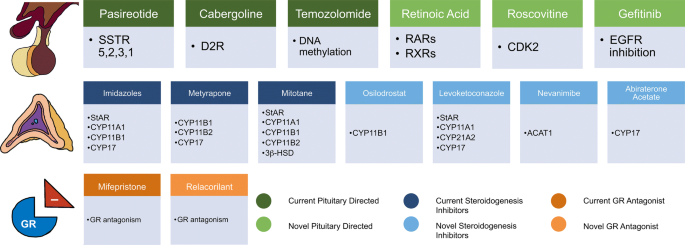
Treatment options include:
Reduce the use of corticosteroids
If the cause of Cushing’s syndrome is long-term use of corticosteroid medications, the doctor may be able to control the signs and symptoms of Cushing’s syndrome by gradually lowering the dosage of the corticosteroid-containing medicine over a period of time, while still managing the condition for which you take it. Do not reduce the dose of corticosteroid medications or stop taking them on your own. Don’t do it by yourself. This reduction should be performed only under the control of your medical professional.
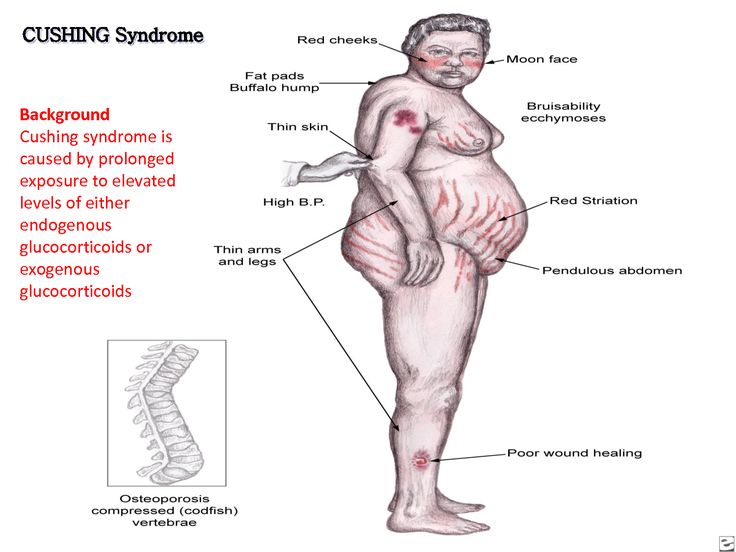
Interrupting the consumption of these medicines quickly could lead to inadequate cortisol levels. Gradually reducing corticosteroid medications allows the body to resume normal cortisol production.
Surgical approach
If a tumor is the cause of Cushing’s syndrome, your doctor may recommend complete surgical removal. Pituitary tumors are usually removed by a neurosurgeon who may perform surgery through the nose. If there is a tumor in the adrenal glands, lungs, or pancreas, a surgeon can remove it with standard surgery or using minimally invasive surgical techniques with smaller incisions.
After surgery, you will need to take cortisol replacement medications to ensure your body gets the right amount of cortisol. In most cases, your adrenal hormone production will eventually return to normal and your doctor may stop your adrenal replacement medications. Your endocrinologist will run blood tests to determine if a cortisol replacement is needed and when it can be stopped. However, this process can take up to a year or more. In some cases, people with Cushing’s syndrome never return to normal adrenal function. They then need lifelong hormone replacement therapy.
Radiotherapy
If the surgeon cannot completely remove a pituitary tumor, he will usually prescribe radiation therapy and surgery. Additionally, radiation can be used for people who are not suitable candidates for surgery.
The radiation can be given in small doses over a six-week period or with a technique called stereotaxic radiosurgery. In the latter procedure, a large one-time radiation dose is delivered to the tumor, and radiation exposure to surrounding tissues is minimized.
Medications
Treatment for Cushing’s syndrome with prescription medications can be applied to regulate cortisol fabrication by the patient’s endocrine system if both surgery and radiation don’t achieve the expected improvement. Medications can also be used before surgery in patients with Cushing’s syndrome to improve signs and symptoms and minimize the risk of surgery. Drug therapy may not completely improve all symptoms of excess cortisol.
Medications for Cushing’s disease treatment used to control excessive production of cortisol in the adrenal gland include ketoconazole, mitotane (Lysodren), and metyrapone (metopirone).
Mifepristone (Korlym, Mifeprex) is approved for people with Cushing’s syndrome with type 2 diabetes or glucose intolerance. Mifepristone doesn’t decrease cortisol production, but it does block the effects of cortisol on your tissues.
Side effects of these drugs can include fatigue, nausea, vomiting, headache, muscle pain, high blood pressure, potassium deficiency, and swelling. Some patients manifest even more critical side effects such as neurological issues and liver harmfulness.
In some cases, a tumor or its treatment causes the pituitary gland or adrenal gland to not produce enough other hormones, and your doctor will recommend hormone replacement therapy.
If none of these treatment options are appropriate or effective, your doctor may recommend surgical removal of the adrenal glands (bilateral adrenalectomy). This procedure will cure excess cortisol production but will require lifelong steroids replacement medications.
What is Cushing’s syndrome? What is the difference between Cushing syndrome and disease?
It is well known that with time cancer wears you out. You suffer so much till chemotherapy makes you thin and weak. However, have you ever wondered if some types of cancer that can actually make you fat? Do you know that getting fat may not only be a result of a combination of eating too many calories, being a couch potato, and having genes that make it easy for you to get fat? There is actually a disease that makes you fat – with or without eating. In fact, most cases of this disease are caused by a type of tumor.

This disease is Cushing’s disease. Cushing’s disease can be a very severe condition and has a lot of problems coming with it. In fact, due to the multitude of health problems that can come with the disease including those that come with obesity like diabetes, hypertension, and heart disease; and those that come with Cushing’s disease-like weak bones. If you still think these problems are not that serious, it is estimated medically that due to the severity of these symptoms a person with Cushing’s disease has about 4 or 5 years to live after diagnosis if it’s not treated. That is very serious if you ask me. In the next sections, I will talk more about the causes of Cushing’s syndrome, and homeopathic medicines you can use.
Cushing syndrome is a disorder caused by exposure of the body to an excess of the hormone cortisol. Cortisol influences and impacts all kinds of tissues and organs in the human body. These combined effects are known as Cushing’s syndrome.
Cushing’s syndrome can be caused by overuse of cortisol, such as in the treatment of chronic asthma or rheumatoid arthritis (iatrogenic Cushing syndrome), excessive production of cortisol from an adrenal gland tumor, or elsewhere in the body (ectopic Cushing’s syndrome), or a tumor of the pituitary gland secreting the adrenocorticotropic hormone (ACTH) which stimulates the overproduction of cortisol by the adrenal gland (Cushing’s disease).
Cortisol is a normal hormone produced in the outer part of the adrenal glands. When functioning properly, cortisol helps the body respond to stress and change. It mobilizes nutrients, changes the body’s response to inflammation, stimulates the liver to increase blood sugar, and helps control the amount of water in the body. Cortisol creation is regulated by the ACTH hormone formed in the pituitary gland.
Cushing’s syndrome occurs when your body has too much of the hormone cortisol over time. This could be because you are taking oral corticosteroid medications. Or your body may be producing too much cortisol.
Too much cortisol can cause some of the hallmarks of Cushing’s syndrome – a greasy hump between the shoulders, a rounded face, and pink or purple stretch marks on the skin. Cushing’s syndrome can also result in high blood pressure, bone loss, and sometimes type 2 diabetes.
Treating Cushing’s syndrome can restore the body’s cortisol levels to normal and relieve symptoms. The quicker treatment for Cushing’s syndrome is started, the better the possibilities of improvement.
- Approximately 10-15 individuals per million of the population are impacted by Cushing’s disease every year.
- The tumor of the cells of the Pituitary gland, known as Pituitary adenoma or Cushing’s disease accounts for over 70 percent of medical cases in grown-ups and about 60 to 70 percent of cases in kids and youths.
- Cushing’s syndrome, however, most frequently impacts adults among the ages of 20 and 50 and this condition is more widespread in females, accounting for about 70 percent of all cases.
Types and causes of Cushing’s syndrome.
Cushing’s syndrome can be caused by different things. They can be either ACTH-dependent or ACTH-independent causes. The major cause in about 70% to 85% of cases is due to adrenocorticotropic hormone (ACTH) dependent clauses. ACTH is a hormone that increases the levels of the stress hormone cortisol in the body. 80% of ACTH-dependent Cushing’s syndrome is caused by a tumor in the pituitary gland in the brain (pituitary adenomas) and about 20% are caused by tumors that secrete ACTH on other parts of the brain, or abnormally enlarged pituitary glands. These tumors will cause over-production of ACTH which will then stimulate the adrenal glands to produce too much cortisol which is responsible for much of what you see in Cushing’s disease. The minor causes are ACTH-independent cause which makes about 15-20% of the cases. These are caused by tumors of the adrenal glands which can be adenomas (benign tumors) or carcinomas (malignant cancerous tumors). This will cause direct over-production of cortisol by the adrenal glands. Other things which can mimic (but not necessarily cause) Cushing’s disease include drugs like steroids, chronic alcohol use, and obesity. One thing that is usually unique in Cushing’s disease is that there is usually an abnormally high level of the stress hormone cortisol in Cushing’s disease. Cushing’s disease usually shows as unexplained obesity, moon-shaped face, fatty deposits on the shoulders which look like buffalo humps, and at times easy bruising on the skin.
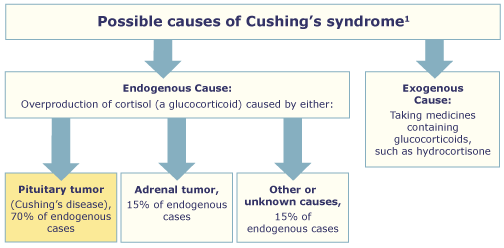
Conventional medicine given to stop Cushing’s disease aims to reduce the level of cortisol in the body and to reduce any gland tumor that may be there. Some of these medicines include the commonly known antifungal, ketoconazole, and others like metyrapone, aminoglutethimide, mitotane, etomidate, anticancer medications to suppress tumors, and so on. They all have their side effects; the side effects of anticancer meds are very terrible and ketoconazole can have terrible effects on the liver so much so that it is no longer recommended as an antifungal but used majorly for Cushing’s disease because of the seriousness of Cushing’s disease.
Cushing’s disease
When we say Cushing’s disease we mean Pituitary adenoma. A pituitary adenoma is benign hyperplasia of the cells of the pituitary gland that leads to increased quantities of ACTH triggering excessive production of cortisol. Most patients have a single adenoma. Initially explained in 1912 by neurosurgeon Harvey Cushing, MD, in his manuscript “The Pituitary Body and Its Disorders”, Cushing’s disease is the most popular cause of spontaneous Cushing’s, accounting for 60 to 70 percent of all clinical cases.
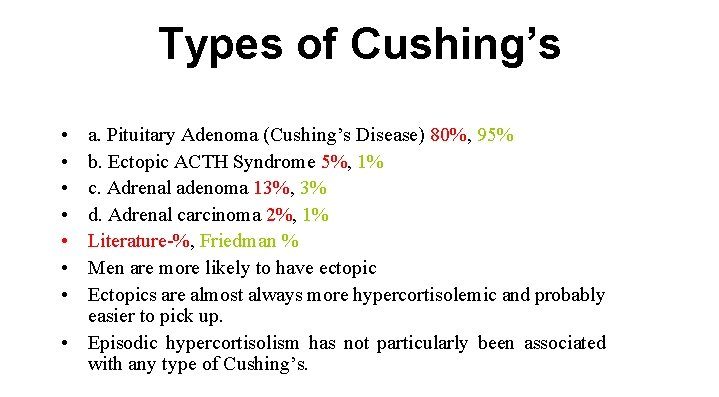
Ectopic ACTH syndrome
Some benign or malignant cancers that develop outside of the pituitary gland can produce ACTH. This disorder is identified as ectopic ACTH syndrome. Tumors in the lungs (either adenomas or carcinoids) lead to higher than 50 percent of Ectopic ACTH syndrome cases. Other not-so-common categories of growths that can lead to the massive fabrication of ACTH are Thymomas aka NET (Neuroendocrine tumors of the thymus), Pancreatic neuroendocrine tumors, and Medullary thyroid cancer.
Adrenal tumors
An abnormality of the adrenal gland, such as a tumor of the adrenal gland, can cause Cushing’s syndrome. Most of these clinical cases consist of non-malignant growths termed adrenal adenomas, which cause a release of excess cortisol into the bloodstream.
Adrenal cortex cancers, or adrenal gland cancers, are the rarest cause of Cushing’s syndrome. Malignant cells emit disproportionate levels of some adrenal cortex hormones, including cortisol and adrenal androgens. Adrenal cortex cancer often causes very high hormone levels and rapid onset of symptoms.
Familial Cushing’s Syndrome
Most cases of Cushing’s syndrome are not genetic. Nevertheless, some individuals can develop Cushing’s syndrome due to a genetic tendency to develop benign or malignant tumors in one or more endocrine secretors. In primary pigmented micronodular adrenal disease, children or young adults develop small, cortisol-producing adrenal tumors. In type I of multiple endocrine neoplasias (MEN I), hormone-secreting tumors of the parathyroid glands, pancreas, and pituitary gland can occur. Cushing’s syndrome in type I men can be caused by a pituitary tumor, an ectopic tumor, or an adrenal tumor.
Signs and symptoms of Cushing’s syndrome
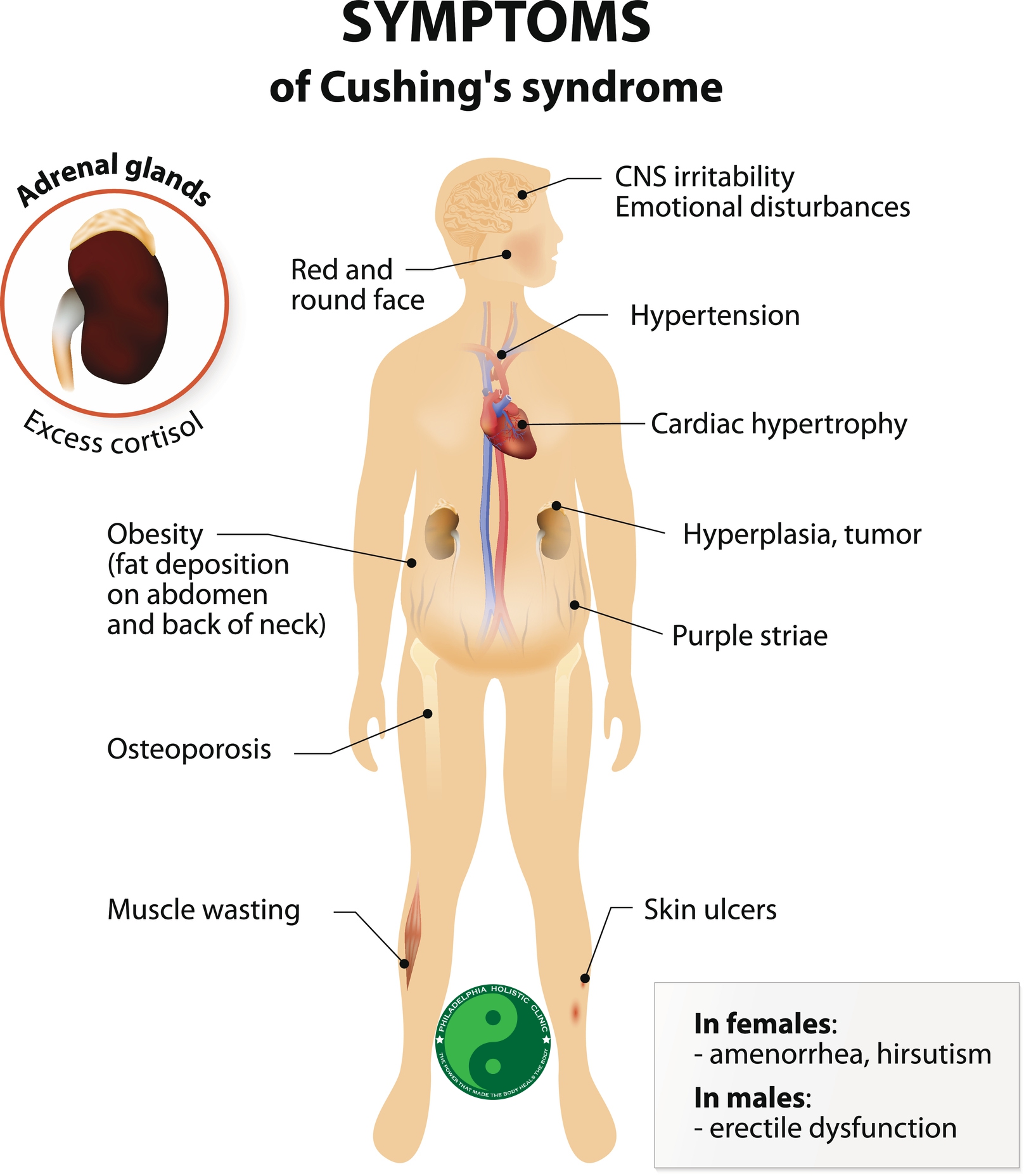
- Weight gain in the face area (moon face)
- Weight gain above the collarbone (supraclavicular fat pad)
- Weight gain on the back of the neck (buffalo hump)
- Skin changes with easy bruising of the extremities and development of purple stretch marks (striae) particularly on the abdomen or axillary region
- Red, round face (plethora)
- Central obesity with weight gain centered on the chest and abdomen with lean arms and legs
- Excessive hair growth (hirsutism) on the face, neck, chest, abdomen, and thighs
- female pattern baldness
- Generalized weakness and fatigue
- Blurred vision
- Vertigo
- Muscle weakness
- Menstrual disturbances in women (amenorrhea)
- Decreased fertility and/or sexual desire (libido)
- Hypertension
- Poor wound healing
- Diabetes mellitus
- Severe depression
- Extreme mood swings
Homeopathy and Cushing’s syndrome
There are many homeopathic remedies that can help, depending on the specific symptoms. Your homeopath will examine you and prescribe the appropriate remedy for you. Homeopathy has been described as a medicine that can only be prescribed on the basis of the individual symptoms shown, adapting the remedy to the patient, not the disease. Forty-one cases of Cushing’s disease were treated with an identical mixture of two homeopathic remedies (ACTH 30c and Quercus robur 30c), and the clinical improvements were observed in the cases evaluated. The aim of the clinical study was to determine whether a standardized approach, using homeopathically prepared remedies, was a valid therapy system for this disease and, if so, whether the results were repeatable among patients. The overall success rate of the therapy was 80% and the results were broadly similar between the two patient groups, indicating that homeopathy lends itself to the treatment of Cushing’s syndrome and also to cohort studies and group medicine. . The British Homeopathic Journal published this study in 2001.
What are the best homeopathic remedies for Cushing’s syndrome?
Cushing’s disease treatment using homeopathic natural remedies becomes more and more popular around the world and in the USA.
Quercus Robur: this remedy is derived from acorns. It is useful in dropsy, reduced mental responsiveness, puffiness, cravings, ascites (accumulation of fluids in the abdomen which causes abdominal swelling), breathlessness, and varicose veins which can be seen in Cushing’s disease. Quercus Robur is one of the major homeopathic remedies for Cushing’s disease treatment.
Adrenalinum: this is very good for adrenal balance. It is useful for Cushing’s syndrome treatment caused by an over-productive adrenal gland as we normally see in ACTH-independent Cushing’s syndrome.
Arsenicum Album: This is very good for excessive thirst (usually due to diabetic complications); digestive upset including nausea, vomiting, and stomach pains; skin problems like itching, burning, dry, and easily irritated skin. All these symptoms can be seen in people suffering from Cushing’s disease.
Pituitary Posterium: this is very good for most people with Cushing’s disease who have ACTH-dependent Cushing’s syndrome. This is because it helps with problems in the pituitary glands.
Sulfur: this helps with pain (due to osteoporosis which is weakening of the bones seen in Cushing’s syndrome), frequent urination (can be seen in diabetic complications of Cushing’s syndrome), skin problems, and liver problems.
Chelidonium Majus is useful in the liver, bile, and digestive issues in Cushing’s syndrome.
Hepar Sulfuris Calcareum is useful in skin problems, abdominal distention due to ascites or bloating, and liver problems.
Mercurius Solubilis: useful for digestive issues, jaundice, enlarged liver, vertigo, intense thirst, memory and thinking issues, and belching.
A combination of these and other homeopathic medicines can give you the best in Cushing’s disease treatment. The type of homeopathic remedies you may need will be different depending on your situation so it is advisable to see an expert for homeopathic therapies.
Homeopathic treatment for Cushing’s syndrome in Philadelphia
For homeopathic treatment for Cushing’s syndrome contact our clinic and we’ll help you to book an appointment for the initial homeopathic evaluation. During the appointment, Dr. Tsan will examine you and perform all necessary tests to better pinpoint the type of Cushing’s syndrome and to select the most customized homeopathic protocol for you.
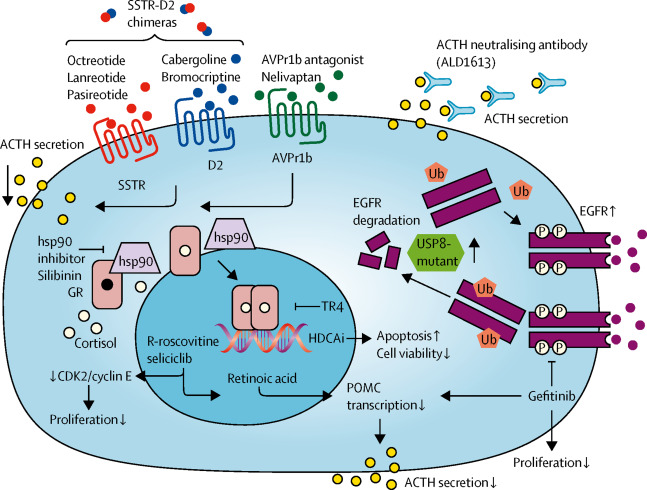
Comments
Post a Comment